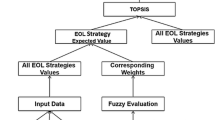This paper presents a theoretical framework on the integration of simplified Life Cycle Assesment (LCA), Life Cycle Costing (LCC) and Quality Function Deployment (QFD) methodologies for the purpose of strategic selection of product improvement alternatives with consideration to data uncertainty. The research focus is on how manufacturing companies can be assisted in design of products so that quality, environmental and cost (QEC) requirements of stakeholders in the life cycle stages of the product system are addressed at an early stage where data imprecision is common. The consideration of these three design requirements leads to a multi-attribute decision situation with regard to the selection of an optimal product system improvement concept. The main objective is to develop a decision-oriented life cycle approach that integrates QEC parameters at an early stage of product development. A conceptual approach was developed which includes: (1) identification and documentation of QEC requirements’ information using streamlined LCA, LCC and QFD; (2) generation of alternative concepts for product improvements and construction of sustainable concept comparison matrix where fuzzy terms were adopted to describe relationships and importance; (3) fuzzy linguistic decision support system was developed and applied to evaluate and select the optimal sustainable product improvement alternative under data uncertainty; (4) sensitivity and statistical analyses. Ranking of alternative sustainable options with respect to environment, cost and quality was reported.
Similar content being viewed by others
References
Y. Asiedu P. Gu (1998) ArticleTitleProduct Life Cycle Cost Analysis: State of the Art Review International Journal of Production Research 36 IssueID4 883–908 Occurrence Handle0947.90558 Occurrence Handle10.1080/002075498193444
Berglund, R. (1993), QFD: A Critical Tool for Environmental Decision Making, in ASQC Quality Congress Transactions, pp. 593–599
S. Dowlatshani (1992) ArticleTitleProduct Design in a Concurrent Engineering Environment: An Optimisation Approach Journal of Production Research 30 IssueID8 1803–1818
W. Fabrycky B. Blanchard (1991) Life Cycle Cost and Economic Analysis New Jersey Prentice Hall
J. Fiksel (1996) Design for Environment: Creating Eco-efficient Products and Process McGraw-Hill USA
T. Graedel B.R. Allenby (1995) Industrial Ecology New Jersey Prentice Hall
A. Gupta K. Sharma (1996) ArticleTitleEnvironmental Operations Management: An Opportunity for Improvement Production and Inventory Management Journal 37 IssueID3 40–46 Occurrence Handle1380883
Halog, A. (2002a), A Life Cycle Approach for Strategic Selection of Sustainable Product Improvement Alternatives under Data Uncertainty, Proceedings of the 5th International Conference on EcoBalance, Tsukuba, Japan, Nov. 6–8, pp. 515–518
Halog, A. (2002b), Selection of Sustainable Product Improvement Alternatives, Ph.D. Dissertation, Faculty of Economics and Business Engineering, University of Karlsruhe (published electronically)
Halog, A., Sagisaka, M. and Inaba A Fuzzy Linguistic Approach for Sustainable Product Design Selection, Annual Research Conference: Accelerating National Development through Enhanced I.E. Research Capability, (Manila, Philippines, October 16–18, 2003)
E. Heinzle K. Hungerbuehler (1997) ArticleTitleIntegrated Process Development: The Key to Future Production of Chemicals Chimia 51 171–173
A. Kaufmann (1975) Introduction to the Theory of Fuzzy Subsets NumberInSeriesI Academic Press New York Occurrence Handle0332.02063
G. Munda (1995) Multicriteria Evaluation in a Fuzzy Environment Physica-Verlag Heidelberg Occurrence Handle0859.90046
InstitutionalAuthorNameNational Research Council (1991) Improving Engineering Design: Designing for Competitive Advantage National Academy Press USA
M. Porter (1985) Competitive Advantage: Creating and Sustaining Superior Performance The Free Press New York
E. Sanchez (1976) ArticleTitleResolution of Composite Fuzzy Relation Equations Information and Control 30 38–48 Occurrence Handle0326.02048 Occurrence Handle437410 Occurrence Handle10.1016/S0019-9958(76)90446-0
Suzuki, M. (2002), Realization of a Sustainable Society – Zero Emission Approaches, Lecture Manuscript, http://www.unu.edu/zef/publications-e/suzuki%20intro%20ZE.pdf
S.C. Weenen ParticleVan J. Eekels (1989) ArticleTitleDesign and Waste Prevention The Environmental Professional 11 231–235
InstitutionalAuthorNameWCED (World Commission on Environment and Development) (1987) Our Common Future Oxford University Press London
L.A. Zadeh (1975) ArticleTitleThe Concept of Linguistic Variable and its Application to Approximate Reasoning II Information Sciences 8 303–357
Zuest, R. and Wagner H. (1992), Consideration of Environment Aspects in Product Design, in 10th International Conference on Engineering Design (ICED), Praha
Author information
Authors and Affiliations
Rights and permissions
About this article
Cite this article
Halog, A. An approach to selection of sustainable product improvement alternatives with data uncertainty. J Sustain Prod Des 4, 3–19 (2004). https://doi.org/10.1007/s10970-006-0002-y
Issue Date:
DOI: https://doi.org/10.1007/s10970-006-0002-y



